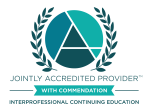FAQs
Q. Who can give credit for activities held at Washington University?
Q. Do all of these policies and procedures need to be followed if the CME event is not held on Washington University campus?
Q. What is the ACCME (Accreditation Council for Continuing Medical Education)?
ACCME Accreditation Criteria
ACCME Standards for Standards for Integrity and Independence in Accredited Continuing Education
ACCME Policies
Q. What type of continuing education credit does Washington University offer?

We are also accredited to offer Council on Optometric Practitioner Education (COPE) credits. Check individual activity descriptions to determine which of these credit type(s) is/are available.
Q. There is so much free CME credit online. Why do I have to pay for CME credit at Washington University?
The latter requires reviewing financial disclosures of all individuals involved in the planning and presentation of the educational activity, ensuring that any potential conflict of interest is mitigated, and confirming through post-activity evaluations that participants did not perceive a bias. Thus the accredited organization must be involved in the planning and monitoring of all CME activities. The standards for an organization to become an accredited provider are steep—steeper yet for organizations like Washington University that have Joint Accreditation for Interprofessional Continuing Education, which permits us to accredit continuing education activities for nursing and pharmacy credit in addition to physician credit. Not surprisingly, accredited organizations must pay an annual fee to the accrediting body, must pay staff to perform the regulatory work, and must pay database fees associated with maintaining records.
Q. What type of CME courses does Washington University offer?
- Live Activities
- Internet Enduring Material (CMEOnline)
- Regularly Scheduled Series (RSS)
- Learning from Teaching
- Journal-based CME
